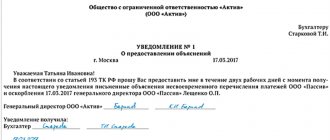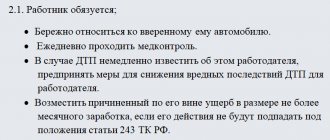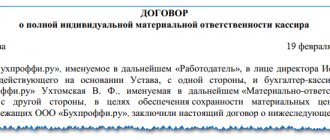Home / Labor Law / Responsibility / Disciplinary
Back
Published: 06/04/2016
Reading time: 9 min
0
4854
State civil servants are identified as a separate category of workers, since their labor is regulated in a special manner. In addition to the Labor Code of the Russian Federation, they are also subject to certain laws and regulations.
There are certain features when imposing a disciplinary sanction on a civil servant . It is worth considering in more detail what types of such penalties can be applied and on what grounds.
- Legislative regulation and types of disciplinary liability
- Grounds for prosecution
- Applying order
- Time limits for bringing to justice
- Situations in which a civil servant cannot be held accountable
Procedure for bringing to responsibility
Bringing a civil servant to justice begins with identifying the fact of the offense committed and occurs in the following order:
- Upon the commission of an offense, a memo is drawn up addressed to the head of the government agency, indicating the possible perpetrators.
- Explanatory notes will be required from civil servants accused of misconduct.
- The head of the department initiates an internal audit.
- Based on the results of the inspection, a conclusion is made.
- An act of enforcement is drawn up.
- A copy of the act is handed over to the civil servant who committed the offense against signature.
If the accused refuses to provide explanatory statements, a report is drawn up within two days, after which an internal inspection begins, for which 30 days are allotted. The following are involved in the inspection:
- personnel service;
- legal service;
- representatives of the trade union committee.
During the internal audit it is necessary to establish:
- fact of committing an offense;
- presence of civil servant's guilt;
- reasons and motives for the offense;
- degree of damage or harm caused by the offense.
Expert opinion
Semenov Alexander Vladimirovich
Legal consultant with 10 years of experience. Specializes in the field of civil law. Member of the Bar Association.
During the inspection, accused employees have the right to give explanations, submit applications, complaints and appeals, and get acquainted with the results of expert assessments.
Detailed instructions for conducting internal audits have been developed and adopted for individual federal institutions. In particular, the procedure for conducting inspections in the Ministry of Education was approved by Order of the Ministry of Education and Science No. 796.
The penalty is imposed taking into account the severity of the offense, the degree of guilt, specific circumstances and past merits of the accused . As a rule, a civil servant who is in good standing and has state awards may not be punished for a minor one-time offense (for example, being late for up to 1 hour), provided that the offense is of a subordinate nature and did not cause real harm.
The delivery of a copy of the act of recovery to a civil servant must be carried out within five days from the moment the act is signed by the employer’s representative. If a civil servant refuses to sign the act, a mark is placed in the document with the wording: “Refused to sign.”
In the absence of such grounds, a civil servant can appeal a disciplinary sanction only by appealing to a court of general jurisdiction.
Disciplinary action procedure
In order to competently and in accordance with the law apply penalties to an erring public servant, it is necessary to follow the procedure that consists of following the diagram below:
- The need to conduct an internal audit, during which it will be determined whether a violation of labor discipline actually occurred. It is also necessary to find out under what circumstances the violation occurred.
- Management must require the civil servant to provide an explanatory note indicating the reasons for the dishonest attitude towards work.
- Next, the authorities decide on the method of disciplinary punishment, depending on the justifications for the action contained in the explanatory note.
- An order is issued to apply disciplinary measures against the civil servant.
- The civil servant puts his signature on the order.
- The order comes into force and the civil servant is held accountable.
Terms of application and removal of penalties
The penalty must be imposed within a month from the moment the offense was discovered, excluding the periods:
- internal audit;
- being on sick leave;
- being on vacation;
- absence of the accused from duty for other valid reasons.
The penalty must be applied within six months from the moment the offense was discovered, otherwise the penalty will not be applied and the entry will be kept in the personal file. If a violation is identified during an audit, then the penalty must be applied within two years, minus the time of proceedings on the criminal component of the case (if any).
Disciplinary action is applied to civil servants not only in cases of typical misconduct for hired employees, but also in cases of loss of trust or making rash decisions. When conducting an internal audit, the principle of innocence applies, that is, the accused is not obliged to prove his innocence, and the lack of evidence is interpreted in his favor.
Legal Aid Center We provide free legal assistance to the population
The state civil service differs from other labor activities in the social status of employers - the totality of their rights and obligations. The state vests persons in the service with broad powers and provides them with high social security.
Along with this legislation, the specifics of bringing civil servants to disciplinary liability are established.
- 1 Disciplinary liability of civil civil servants - grounds 1.1 Types of disciplinary liability of civil servants
- 1.2 The procedure for bringing employees to disciplinary liability
- 1.3 Deadline for bringing civil servants to disciplinary liability
- 2.1 Law on disciplinary liability of civil servants
Grounds and conditions of use
Penalties other than dismissal are applied if the following grounds exist:
- late;
- failure to comply with job description;
- errors in calculations;
- misinterpretation and application of legal regulations;
- rudeness and boorish attitude towards civilian visitors.
Penalties for errors in calculations apply to employees involved in the development of methods for calculating salaries for public sector employees and other tasks related to calculations. For the first minor offense, a reprimand is usually issued, for a repeated offense (if the remark has not yet been removed) a reprimand is given, and for systematic minor offenses or one significant offense, a warning is given about incomplete compliance.
Dismissal, as the most severe penalty, is carried out on the following grounds:
- absenteeism;
- appearing at work while drunk or under the influence of drugs;
- disclosure of state secrets and other official information;
- theft or deliberate damage to property in the workplace;
- the presence of a large number of offenses when a penalty has already been imposed;
- revealing the fact of providing deliberately false information during employment or providing false documents.
Penalties may be applied to civil servants holding leadership positions if they make an ill-considered decision that harms state power.
Disclosure of official information means the communication to third parties of any information obtained while in public service, if this entailed negative consequences for government agencies or violated the rights of third parties.
Initiating a criminal case against a civil servant due to abuse of power or taking a bribe is grounds for dismissal due to loss of trust.
The conditions for applying a disciplinary sanction to a civil servant are:
- presence of a misconduct event;
- proof of guilt of a civil servant;
- absence of insurmountable circumstances.
Insurmountable circumstances include circumstances in which a civil servant could not avoid committing an offense for reasons beyond his control, including psychological and physical coercion, blackmail, etc.
The penalty is applied regardless of the presence of malicious intent, but the absence of unlawful intentions for minor offenses can mitigate the imposed penalty.
Disciplinary liability of civil public servants - grounds
The concept and signs of disciplinary liability of civil servants are clearly defined in Federal Law No. 79 of 2004.
Disciplinary liability is punitive sanctions imposed for committing any offense. Reasons are what lead to negative consequences. The basis for bringing civil servants to punishment is always the commission of a disciplinary offense.
Misconduct can be different:
- Failure to fulfill official duties;
- Failure to perform duties properly;
- Being late for work;
- Absenteeism;
- Appearing at work while intoxicated;
- Providing false information about income, expenses and property, both one’s own and those of family members;
- Illegal acts of corruption;
- Administrative offenses;
- A lot others.
The structure of the offense itself must include the employee’s guilt, action or inaction, as well as the onset of negative consequences.
For example, a bailiff overslept and came to work 2 hours later than the start of the working day, as a result of which a huge queue of people formed at the reception. It is obvious that there are negative consequences, inaction and the guilt of the employee himself.
Types of disciplinary liability of civil servants
The features of disciplinary liability of civil servants are: firstly, in the establishment of new types of penalties, and secondly, in a special procedure for their imposition.
Article 57 of the Federal Law establishes such types of penalties as a reprimand, a reprimand, a warning about incomplete job performance, and the most serious - dismissal. Dismissal occurs when employees commit serious offenses, all of which are described in detail in Article 37 of the Federal Law.
For committing one violation, the employer bears only one punishment; it is not legal to punish twice for one offense.
The use of other types of penalties not prescribed in the regulatory legal act is impossible.
The procedure for bringing employees to disciplinary liability
The structure of disciplinary liability of a civil servant includes:
- The guilt of the offender;
- Action or inaction as the main part;
- The circumstances of the incident;
- Negative consequences.
All components are inextricably linked with each other and must have an investigative part, i.e. consequences occur as a result of the illegal act itself .
As soon as the head of a government agency becomes aware that the employer has committed an offense, an explanation is taken from him. In case of refusal, an act is drawn up.
In all cases, an investigation is carried out to examine all the circumstances of the incident. Based on the results of the investigation, a conclusion of guilt or innocence is made, after which an order is issued to impose a penalty.
Within five days, the employee receives a copy of such an order. If an employee does not agree with the decision on punishment, he can appeal it.
Expert opinion
Semenov Alexander Vladimirovich
Legal consultant with 10 years of experience. Specializes in the field of civil law. Member of the Bar Association.
Thus, the mandatory inspection of the fact that an employer has committed an offense is an essential difference compared to other work activities, when it is enough to just select an explanation.
Deadline for bringing civil servants to disciplinary liability
The total period for imposing a penalty is one month from the date of receipt of information about it. This period is extended in case of illness or vacation of the employer, but in any case cannot be more than six months.
The exception is when the misconduct is revealed as a result of an audit, in which case the period is two years.
In cases where information about a violation was received later than the specified deadlines, it is customary to say that the statute of limitations has expired.
Legislative regulation and types of disciplinary liability
The main legislative act that regulates the issues of entry into the civil service in the Russian Federation, its passage and termination is the Federal Law “On the State Civil Service of the Russian Federation”.
In particular, this law pays attention to the following issues:
- positions and class ranks of the civil service;
- rights and obligations of a civil servant;
- conditions and rules for admission to civil service;
- rules of official discipline;
- grounds for termination of civil service, etc.
This law also lists disciplinary sanctions that can be applied to an employee if he commits certain offenses or violates official discipline.
In accordance with Art. 57 of the Law, the following types of disciplinary sanctions may be imposed on a civil servant:
- comment;
- rebuke;
- warning about incomplete job compliance;
- dismissal.
Before changes made to the Law in 2013, this article also provided for such a type of punishment as release from the position being filled.
The penalties currently in effect (with the exception of one) are similar to those specified in Art. 192 Labor Code of the Russian Federation. They are listed in order of increasing severity and are also applied depending on how serious the offense was committed by the employee.
The first three of these punishments (reprimand, reprimand and warning) are more loyal to the employee and practically do not differ from each other. The difference may only lie in the wording of the punishment, which is indicated in the order to impose a penalty.
These penalties are imposed in writing and communicated to the employee. Entries about this punishment are not made in his work book, but they can be displayed on his personal card. After a certain time has passed, the punishment is lifted, but only on the condition that during this period the employee no longer violated labor discipline.
As for dismissal, this measure is more stringent and is applied only in cases permitted by law. In this case, the manager must follow the established procedure for holding the subordinate accountable and prepare all the necessary documents.
The employer has the right to independently choose the specific penalty that will be applied to the employee.
Imposing a penalty is his right, not his obligation. For example, he may limit himself to a verbal remark and not document the violation at all. However, the general rule is that only one penalty can be applied for one disciplinary offense; it is impossible to punish a subordinate in different ways.
Disciplinary liability of civil servants - judicial practice
Judicial practice consists mainly of cases where an employee does not agree with the penalty imposed on him or the decision to punish him was illegal. Cases regarding the reinstatement of illegally dismissed workers and their receipt of material compensation for harm and suffering are relevant.
The most frequently recorded facts are that the employee was brought to justice in violation of deadlines and was punished during the period of sick leave. Also, the heads of the authorities do not fully investigate all the circumstances of the violation, do not properly collect all documents related to the case, as a result of which they come to the wrong decision.
Law on Disciplinary Liability of Civil Servants
There is currently no special law on disciplinary liability in relation to civil servants. The legal institution of bringing employers to punishment is regulated by Federal Law No. 79 of 2004. Chapter 12 contains norms of this nature.
In order to avoid unlawful imposition of penalties on employees, heads of government agencies must strictly comply with the requirements of the legislation on this issue.
Similar
The performance of labor duties that are associated with the disposal or use of material assets implies the financial responsibility of the relevant...
Public sector workers make up a significant part of all working people in Russia, and their wages depend...
Collective material responsibility is a complex mechanism of current labor legislation. The agreement on collective liability is drawn up...
Always generally accepted measures are to ensure order in the life of society. If the legal society in its...
Registration of pensions for civil servants is somewhat different from the standard procedure. The main difference is that...
The duty of each employee is to be responsible for the property of the employer. Such property may be entrusted to the employee or...
If an employee does not fulfill his job duties or does it improperly, the employer has the right to impose a disciplinary sanction on him (Article 192 of the Labor Code of the Russian Federation).
In most cases, the list of sanctions is limited to three points: reprimand, reprimand and dismissal. However, for some categories of workers this list is expanded.
Civil servants, in a sense, are representatives of their country and authorities, so the requirements for them differ from the standard ones.
Disciplinary penalties for civil servants (civil servants) - imposed, types
In legal practice, there are four types of liability: disciplinary, administrative, material, criminal. As a rule, criminal liability is the most frightening, since its consequences are prison and confiscation of property.
Material and administrative are expressed in the form of payment of fines, and disciplinary “puts an end to” the employee as an official. The result is demotion, lack of career growth and reprimand from colleagues.
What it is
Disciplinary sanctions are measures to punish the guilty person with whom a service contract or employment contract has been concluded. A disciplinary sanction is imposed if the essence of the guilt is proven and obvious to the employer’s representative.
The reason for initiating the procedure may be not only obvious lateness or absenteeism, but also failure to fulfill official duties or improper performance thereof. The only condition: this workload is previously specified in the job description and agreed upon with the employee under signature.
The term “disciplinary sanction” is described in the Labor Code. According to Article 192, there are three types of official censure:
- Comment;
- Rebuke;
- Dismissal.
To justify the employer's actions, it is necessary to prove the guilt of the violator of discipline. If these facts are documented, then the procedure for declaring foreclosure begins.
To keep everything legal, this controversial issue can be resolved by a commission on individual labor disputes.
Disciplinary sanctions for civil servants clearly do not differ from the generally accepted ones. True, the Law on Civil Service No. 79-FZ is taken into account here in relation to the Labor Code of the Russian Federation. This regulation increases the employee’s liability measures several times.
After all, the status of a state executor requires compliance with prohibitions and restrictions, and anti-corruption legislation.
The procedure for applying disciplinary sanctions against civil servants
The procedure for applying disciplinary sanctions is regulated in Article 58 of the Civil Service Law.
The procedure is divided into several stages:
- Stage 1. Requirement to write a written explanation of the violation.
- Stage 2. Drawing up a report if the employee refuses to give written and oral explanations.
- Stage 3. Conducting an internal audit. When initiating an official investigation, all circumstances are taken into account: 1) the severity and degree of guilt; 2) intentional or unintentional actions; 3) events that aggravate the position and degree of guilt of the civil servant; 4) facts that mitigate the liability of the offender.
- Stage 4. Announcement of a disciplinary sanction in the form of an act (order), which indicates the grounds for its application.
- Stage 5. If the employee wishes, the legality of the imposed official penalty can be challenged. This action is initiated in court or discussed by a commission on individual labor disputes, which is created under a government agency.
- Stage 6. Removal of official sanction.
Terms of use
The Civil Service Law protects persons holding civil service positions. Therefore, only one month is given to announce a reprimand, reprimand and other measures. These 30 days are counted from the moment of documentary recording of the offense (inspection report).
If the employer (representative of the employer) did not meet this deadline, then let him blame himself.
A different procedure exists for inspections of financial and economic activities. If the organization has been audited and an audit has occurred, then 2 years are given to declare a disciplinary sanction. This period does not include time spent on legal proceedings.
In general, the employer has 6 months to begin punitive measures. Periods of temporary incapacity for work and vacations are excluded from this time period.
So if a government employee is on parental leave or on long-term sick leave, then the employer does not have the opportunity to punish him “to the fullest extent of the law.
The validity period of a disciplinary sanction such as a reprimand or reprimand is exactly one year. After a year, it is removed from the employee. No one has the right to punish an employee again for the same offense.
Disciplinary sanctions against civil servants are effective methods of combating corruption, anti-moral behavior and non-compliance with the Code of Conduct and Internal Labor Regulations. Any person who assumes certain official responsibilities must understand the extent of responsibility for violations of the Laws.
Attention!
- Due to frequent changes in legislation, information sometimes becomes outdated faster than we can update it on the website.
- All cases are very individual and depend on many factors. Basic information does not guarantee a solution to your specific problems.
That's why FREE expert consultants work for you around the clock!
APPLICATIONS AND CALLS ARE ACCEPTED 24/7 and 7 days a week.
Source: https://biznes-delo.ru/vzyskanie/disciplinarnye-vzyskaniya-gosudarstvennyx-sluzhashhix.html
Who are government employees?
Since government positions are introduced to exercise the powers of federal bodies and bodies of constituent entities of the Russian Federation, formally the state is considered the employer of such employees, and the head of the government body acts as a representative of the employer. (Art.
1 Federal Law No. 79). When entering the civil service, employees enter into a contract, their activities are financed from the federal or regional budget.
Civil servants are divided into four categories (Article 9 of Federal Law No. 79):
| Managers | Heads of government bodies and their deputies. They can be appointed for a specific period or indefinitely. |
| Assistants (advisers) | Appointed to assist managers. Their term of office expires simultaneously with the change of leadership. |
| Specialists | People of different professions who ensure that government agencies fulfill their tasks and functions. |
| Supporting specialists | Employees whose tasks include economic, financial, organizational, documentation and other support for the activities of government bodies. |
The term of office of the last two categories of employees is initially unlimited.
Types of penalties
Disciplinary sanctions that can be imposed on civil servants are listed in Art. 57 Federal Law No. 79:
- comment;
- rebuke;
- warning about incomplete job compliance;
- dismissal from the civil service on the grounds provided for in Art. 37 Federal Law No. 79.
Thus, to the three standard types of penalties, one specific one is added - a warning about incomplete compliance. As conceived by legislators, this penalty should be a signal to the person that he is not performing his duties well enough, and to take measures to correct the situation.
What can you be fined for?
According to the law, disciplinary sanctions are imposed for failure to perform or improper performance by a civil servant of his official duties. Important - punishment is possible only if it was his fault.
If a person is not to blame for what happened (for example, he did not complete an order because it was objectively impossible), he cannot be punished.
The main responsibilities of civil servants are listed in Art. 15 Federal Law No. 79. In addition to the requirements to carry out the instructions of managers and their official duties provided for by the job regulations, there are the following points:
- comply with the Constitution of the Russian Federation, federal constitutional laws, federal laws, other regulatory legal acts of the Russian Federation, constitutions (charters), laws and other regulatory legal acts of the constituent entities of the Russian Federation and ensure their implementation;
- perform official duties in accordance with official regulations;
- carry out instructions from relevant managers given within the limits of their powers established by the legislation of the Russian Federation;
- observe the rights and legitimate interests of citizens and organizations when performing official duties;
- comply with the official regulations of the government body;
- maintain the level of qualifications necessary for the proper performance of official duties;
- not to disclose information constituting state or other secrets protected by federal law, as well as information that has become known to him in connection with the performance of official duties, including information relating to the private life and health of citizens or affecting their honor and dignity;
- protect state property, including those provided to him for the performance of official duties;
- provide, in the prescribed manner, information provided by federal law about yourself and your family members;
- report renunciation of citizenship of the Russian Federation or acquisition of citizenship of another state on the day of renunciation of citizenship of the Russian Federation or on the day of acquisition of citizenship of another state;
- comply with restrictions (Article 16 Federal Law No. 79), fulfill obligations and requirements for official conduct, not violate the prohibitions (Article 17 Federal Law No. 79) that are established by this Federal Law and other federal laws;
- inform the employer's representative about personal interests in the performance of official duties, which may lead to a conflict of interest, and take measures to prevent such a conflict.
The procedure for applying disciplinary sanctions under the Labor Code of the Russian Federation
Article 193 of the Labor Code establishes the procedure according to which disciplinary measures must be applied to employees. It includes several actions that need to be documented.
Recording a violation
It is necessary to draw up and approve an act that will confirm the commission of an offense. The form of the act is free.
At least three people must certify the act with their signatures. One of them must be the violator’s immediate superior or a human resources employee.
Documentation of misconduct
To confirm the offense, you must attach supporting documents in copies to the report:
Extract from the internal regulations Personal work schedule Job description Employment agreementOffense Type of supporting document Being late or absenteeism - Time sheet
Extract from the arrival/departure journal
Showing up to work drunk In addition to the documents specified in paragraphs 1-5 for the previous offense - instructions on labor protection and safety precautions It would be useful to include in the set of documents a legal opinion on the legality of applying a particular penalty. It should be noted that such a conclusion does not have the stamp of a mandatory document, and is drawn up solely at the request of the manager. Its absence cannot serve as an excuse for the employee who committed the offense when choosing a sanction.
Request for an explanatory note from the employee
This document is drawn up by the perpetrator of the offense addressed to the head of the enterprise (organization, institution).
In the note, the employee must comprehensively explain the reasons for committing the disciplinary offense. The management of the enterprise has the right to request an explanatory note in person or by registered mail. The period for drawing up the document is two working days. The absence of an explanation is documented by an act of refusal. The act is not an obstacle to the imposition of a penalty.
Preparation and issuance of an order on disciplinary punishment
Responsibility for preparing a package of documents and drawing up an order lies with the personnel department of the enterprise.
The document must be signed by the head of the enterprise.
Employee familiarization
Article 193 of the Labor Code provides for the procedure for bringing to the attention of an employee subject to disciplinary action the results of the investigation and the order.
Three working days are allotted for this process from the moment the order is signed by the head of the enterprise. If an employee refuses to familiarize himself with the results of the investigation of a disciplinary offense committed by him, an act of refusal is drawn up. It is signed by the head of the enterprise and the head of one of the departments, for example, accounting or human resources.
The type of penalty does not change the procedure for its application. It is uniform. Both for a reprimand and reprimand, and for the most severe disciplinary punishment - dismissal.
Why can a civil servant be fired?
Cases where disciplinary action may lead to dismissal are listed in Art. 37 Federal Law No. 79:
- repeated failure to fulfill one’s duties without good reason, if there were other disciplinary sanctions during the year;
- truancy – absence for more than four hours in a row without a valid reason;
- appearing at work under the influence of alcohol or drugs;
- disclosure of state or other secrets protected by law, as well as official information;
- committing theft, embezzlement or intentional damage to someone else's property at the place of work, provided that this fact is confirmed by a court decision or a resolution of the body that considered the case of an administrative offense;
- making an unjustified decision by an employee of the management category that caused the unlawful use of property, violation of its safety or causing other damage to the property of a state body;
- a single gross violation by an employee of a management category of his official duties, if this caused harm to a government agency or violated the legislation of the Russian Federation.
Rules for imposing penalties
Expert opinion
Semenov Alexander Vladimirovich
Legal consultant with 10 years of experience. Specializes in the field of civil law. Member of the Bar Association.
When imposing a penalty, a certain procedure must be followed. Without this, the punishment will be legally considered illegal, even if formally its application is fair.
The procedure is regulated by Art. 58 Federal Law No. 79 and generally coincides with a similar procedure for other categories of employees described in Art.
193 Labor Code of the Russian Federation. However, there are specific nuances here that relate mainly to the investigation of the incident.
Article 58 Federal Law No. 79 - Procedure for applying and lifting disciplinary sanctions
- Before applying disciplinary action, the employer's representative must request an explanation in writing from the civil servant. If a civil servant refuses to give such an explanation, a corresponding act is drawn up. The refusal of a civil servant to give an explanation in writing is not an obstacle to applying a disciplinary sanction.
- Before applying a disciplinary sanction, an internal review is carried out.
- When applying a disciplinary sanction, the severity of the disciplinary offense committed by a civil servant, the degree of his guilt, the circumstances under which the disciplinary offense was committed, and the previous results of the civil servant performing his official duties are taken into account.
- A disciplinary sanction is applied immediately after the discovery of a disciplinary offense, but no later than one month from the date of its discovery, not counting the period of temporary incapacity for work of a civil servant, his stay on vacation, other cases of his absence from service for good reasons, as well as the time of an internal inspection.
- A disciplinary sanction cannot be applied later than six months from the date of commission of a disciplinary offense, and based on the results of an inspection of financial and economic activities or an audit - later than two years from the date of commission of a disciplinary offense. The specified time limits do not include the time of criminal proceedings.
- A copy of the act on the application of a disciplinary sanction to a civil servant, indicating the grounds for its application, is handed over to the civil servant against signature within five days from the date of publication of the relevant act.
- A civil servant has the right to appeal a disciplinary sanction in writing to the commission of a state body on official disputes or to court.
- If, within one year from the date of application of the disciplinary sanction provided for in paragraphs 1 - 3 of part 1 of Article 57 of this Federal Law, and the penalty provided for in Article 59.1 of this Federal Law, a civil servant is not subjected to a new disciplinary sanction, he is considered to have no disciplinary sanction.
- The employer's representative has the right to remove a disciplinary sanction from a civil servant before the expiration of one year from the date of application of the disciplinary sanction on his own initiative, at the written request of the civil servant or at the request of his immediate supervisor.
When it becomes known about an offense that is subject to disciplinary liability, a written explanation is required from the employee. Refusal to provide an explanation is not an obstacle to the subsequent imposition of penalties, but must be recorded in a separate act.
Next, it is necessary to conduct an internal audit (Article 59 of Federal Law No. 79). Based on its results, the commission draws up a conclusion, which indicates the need for disciplinary action.
Sanctions can be applied no later than one month from the date of discovery of the offense. This time does not include the period when the guilty employee was on vacation, on sick leave or absent for other valid reasons. The time required for the official check is also not taken into account.
The maximum period during which disciplinary sanctions can be applied to the perpetrator is six months from the date of commission of the offense. Thus, if the fact of the offense comes to light after seven months, it cannot be held accountable for it.
An exception is violations identified as a result of a financial or audit. The statute of limitations for them is two years.
If a criminal case is initiated as a result of the violation, the statute of limitations is also suspended during the investigation.
Disciplinary sanctions against civil servants in 2021 – rules of imposition, types
Discipline in an organization is the foundation of success, so the rules for imposing disciplinary sanctions on civil servants in 2021 will be a pressing issue for employees.
A successful organization depends on the quality of management and each element of the system, which continuously does the work and assignments given to it.
That is why the moment of discipline is so important when it comes to the coherence of the process. The workforce is the same working mechanism, and if one part breaks, all the other parts, like dominoes, also fail.
Discipline in any work team makes it possible to keep all employees under control and accountability.
Therefore, the manager can impose a disciplinary sanction on his employee in case of misconduct on his part.
Basic information
The planned plans, goals, and mission of the organization can only be achieved if the rules and regulations are followed, and as a result, subordinates who follow the instructions of the leader are of great importance.
Also, established standards of behavior in the work team help to avoid possible conflict situations.
A leader is not only a good manager, but also an experienced psychologist. For the organization to be successful, it is necessary to hold regular conversations, communicate with subordinates, and be interested in the life of the entire team.
The main purpose of the conversations will be to convey the idea of discipline and its meaning for each employee.
A successful organization will be one in which every employee understands the importance of following internal regulations.
The downside of a manager is the responsibility assigned to him for the overall work. An example of this is severity and punishment of his subordinates.
This necessary measure must be used only in good faith and in accordance with applicable laws, therefore there are several types of disciplinary sanctions applicable for violations during work.
Disciplinary action can be taken for a number of reasons:
| Failure to comply with general standards | Which apply to all employees. This could be being late or not showing up for work. |
| Safety violation | Also technological instructions at the workplace |
| Failure to comply with discipline in its various manifestations | Showing up for work drunk or under the influence of drugs, fight, conflict, and much more |
| Unsatisfactory performance of assigned tasks | Negligent attitude towards work |
Definitions
The collection order can be of a different nature:
| As a note | This type is most often used when an employee for the first time failed to complete a task, was late for work, or other minor offense. This fact should not be ignored, so a relevant incentive for further motivation of the employee would be to make a remark |
| In the form of a reprimand | A reprimand is received for violations when it is not a minor offense that could have cost with an oral warning, but a measure that is used in more serious cases to psychologically shake up the offending employee |
| In the form of a fine and financial penalties | A fine in material form is a penalty in the form of deprivation of part of an employee’s bonus or salary in order to influence his behavior |
| Dismissal of an employee | The procedure is used in extreme situations, and there must be a compelling reason that allows this to be done without violating the Labor Code and Russian legislation |
| Explanatory letter | This is a document that allows the employee to explain his actions due to the current situation when a violation occurred at work due to his fault |
| Memorandum | This is an internal document that allows you to present the situation to your boss, offer solutions, and also demand that measures be taken to resolve the specified issue. |
| Act on the identification of an offense | A document that indicates the actions of the offender, and also indicates the articles of the charter that were violated by the specified person (employee) during the working day |
| Disciplinary offense | This is poor or complete failure to fulfill required obligations |
The legislative framework
The main provisions that apply to this category are described by Federal Law No. 58 on the public service system.
Also, Federal Law No. 79 of the Russian Federation talks about possible types of penalties that can be applied to civil servants of the Russian Federation:
- comment;
- rebuke;
- warning about the person’s inadequacy for the position held;
- removal from office. This type is specified in paragraph 4. Part 1, Article 57, according to which the offending employee will not be dismissed, but he will be removed from his position from now on and placed on the reserve list;
- dismissal from the staff. Such an action may occur at the initiative of the employer in the event of:
- Inconsistencies of a civil servant with his/her position (loss of confidence, failure to complete tasks, theft, appearing drunk, gross violation, absenteeism, disclosure of trade secrets, etc.).
- Based on medical evidence in case of illness.
- In case of failure to pass certification for advanced training of civil servants.
- According to Art. 57, a penalty can be applied once for each violation of a civil servant, and the employer can choose the type at his own discretion.
The above measures are slightly different from those that apply to ordinary workers. Their peculiarity is the possible delay in job growth, resignation or deprivation of the opportunity to occupy a given position and serve the body.
Application of disciplinary sanctions to civil servants
Disciplinary action against a state civil servant for failure to comply with proper norms, rules, as well as required obligations, the employer may issue a reprimand, which, in his opinion, the culprit deserves.
Read about the removal of disciplinary sanctions here.
The process takes place in several mandatory stages, which are clearly regulated and followed.
First of all, the employer is obliged to invite a civil servant and ask him to state the reason for the offense in the form of an explanatory note.
If a civil servant does not want to explain himself, it is necessary to draw up an appropriate act of his refusal, inviting several witnesses to sign.
: disciplinary action
In any case, reluctance to write will not allow the civil servant to start the collection process.
When drawing up the main document, the employer is obliged to indicate the degree of misconduct, describe the situation in which this problem arose, and demand punishment in the form of selected actions against the accused.
The document is signed by the employer, a copy is made, and transferred within 5 days to a civil servant for information against signature.
Disciplinary action is applied to a civil servant from the moment of notification by the employer no later than 30 days from the day the offense occurred.
For this purpose, special checks can be used that will detect a violation:
- The fact of a violation committed by a civil servant.
- The extent of the damage caused and its nature.
- Circumstances that could motivate a civil servant to act in violation.
The inspection must be carried out no later than 30 days from the date of the decision on this procedure. After the inspection, a written conclusion is drawn up and presented to the employer for further action.
If a civil servant does not agree with the employer’s decision, he has the right to appeal to the court or authorities for resolving legal disputes.
To do this, he is given an official period of 3 months, and in the case of a penalty for dismissal - 1 month. Common reasons for appeals by civil servants:
- Inability to explain the reason and prove your innocence.
- Expiration of the period according to law.
- Imposition of more than 1 penalty for 1 violation.
If the civil servant did not go to court and agreed with the reprimand, the usual period of disciplinary action is 1 year, after which the violation will be canceled.
It is possible to stop the collection against a civil servant earlier if the employer is ready to write a petition to his manager.
The document on early withdrawal must contain the reason for the withdrawal in favor of the civil servant and the number of the penalty that was assigned.
If the penalty was a requirement to vacate a position, the civil servant is sent a reserve list and has the right to participate in the competition for another open position.
Types of liability
Depending on the severity of the offense committed, the following types of liability are applied to a civil servant:
- administrative;
- criminal;
- material.
Basically, administrative responsibility is applied to civil servants, and they bear it with the same rights as other ordinary citizens, according to the Civil Code.
The reason for imposing liability will be failure to comply with the rules and regulations at work, which are their direct job responsibilities related to security, management, etc.
There are three main types of offenses, which are reduced to administrative:
- failure to comply with basic rules;
- illegal assignments for their employees;
- lack of supervision over these employees, which led to violations.
Based on the types, a warning or a fine is applied to a civil servant.
Criminal liability also applies to civil servants with the same rights as ordinary citizens, and their main regulator is the Criminal Code.
This type implies the imposition of large fines or imprisonment of a civil servant. Most often, the reason for such punishment is the use of one’s official duties for mercenary personal purposes or the conduct of illegal activities that can be covered up with one’s powers, abuse of power, bribes.
Financial liability is highly specialized and applies only to civil servants. Depending on the offense and the amount of damage, a fine is imposed, which the employee must compensate without fail.
Official discipline in the workplace
Discipline is observed in all work collectives, and civil servants are no exception. For good work, employees receive performance-based incentives, and in case of non-compliance with established rules and regulations or simply inaction, they are “rewarded” with penalties.
For this purpose, various internal statutory documents are used, as well as a standard code of ethics and official conduct of employees.
It specifies the basic rules that apply to an employee entering government service. organs:
- Be impartial and considerate to everyone.
- Show tolerance and respect.
- Comply with federal laws and other regulations.
- Do not use your official position for your own purposes, etc.
Validity
The penalty is valid for one year, after which it is lifted. If the employer has not detected any violations during this period, no penalty will be applied to the civil servant.
Promotions and awards
For fruitful and faithful service to the state. Bodies are given incentives in the form of:
- Gratitude for the work done with a certain material reward.
- Award in the form of a certificate.
- Payment of financial compensation upon retirement.
- Incentives can be from the government, the president in the form of awards with honorary titles, medals, insignia, etc.
The decision on incentives is made by the employer, and the awards and incentives issued are entered into the civil servant’s work book.
Attention!
- Due to frequent changes in legislation, information sometimes becomes outdated faster than we can update it on the website.
- All cases are very individual and depend on many factors. Basic information does not guarantee a solution to your specific problems.
That's why FREE expert consultants work for you around the clock!
APPLICATIONS AND CALLS ARE ACCEPTED 24/7 and 7 days a week.
Previous entry Next entry
Source: https://yurday.ru/disciplinarnye-vzyskanija-gosudarstvennyh-sluzhashhih/








